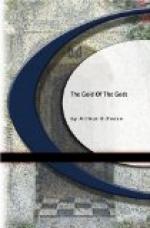XVI
THE EAR IN THE WALL
Perhaps an hour later our laboratory door was flung open suddenly, and both Kennedy and I leaped to our feet.
There was Inez Mendoza, alone, pale and agitated.
“Tell me, Professor Kennedy,” she cried, her hands clasped before her in frantic appeal, “tell me—it isn’t true—is it? He wasn’t there—no—no—no!”
She would have fainted if Craig had not sprung forward and caught her in time to place her in our only easy-chair.
“Walter,” he said, “quick—that bottle of aromatic spirits of ammonia over there—the second from the left.”
I handed it to him, and threw open the window to allow the fresh air to blow in. As I did so one of the papers Kennedy had been studying blew off the table, and, as luck would have it, fell almost before her. She saw it, and in her hypersensitive condition recognized it instantly.
“Oh—that anonymous letter!” she cried. “Tell me—you do not think that—the friend of my father’s that it warned me to beware of— was—”
She did not finish the sentence. She did not need to do so.
“Please, Senorita,” pleaded and soothed Kennedy, “try to be calm. What has happened? Tell me. What is it?”
The ammonia and the fresh air seemed to have done their work, for she managed to brace herself, gripping the arms of the chair tightly and looking up searchingly into Craig’s face.
“It’s about Chester,” she managed to gasp; then seemed unable to go on.
It was the first time I had ever heard her use Lockwood’s first name, and I knew that something had stirred her emotions more deeply than at any time since the death of her father.
“Yes,” prompted Kennedy. “Go on.”
“I have heard that you found foot-prints, shoe-prints, in the dust in the Museum after the dagger was stolen,” she said, speaking rapidly, suppressing her feelings heroically. “Since then you have been collecting prints of shoes—and I’ve heard that the shoe-prints that were found are those of—of Mr. Lockwood. Oh, Professor Kennedy, it cannot be—there must be some mistake.”
For a moment Kennedy did not say anything. He was evidently seeking some way in which to lead up to the revelation of the truth without too much shock.
“You remember that time in the tea room when we were sitting with Senora de Moche?” he asked finally.
“Yes,” she said shortly, as though the very recollection were disagreeable to her.
Kennedy, however, had a disagreeable task, and he felt that it must be performed in the kindest manner.
“You remember then that she said she had one thing more to say, that it was about Mr. Whitney and Mr. Lockwood.”
She was about to interrupt, but he hurried on, giving her no chance to do so. “She asked you to think it over. Suppose they did not have the dagger, she said. Then were their chances of finding the treasure any better than any one else had? And if they did have it, she asked what that meant. It is a dilemma, my dear Senorita, which you must meet some time. Why not meet it now?”




